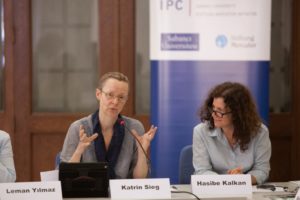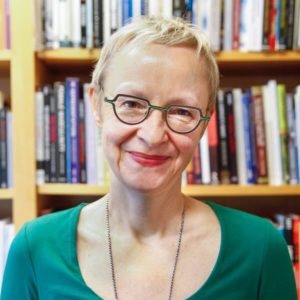Professor Katrin Sieg, who first joined the Georgetown faculty in 2002, will succeed Professor Jeffrey Anderson as director of the BMW Center for German and European Studies, beginning in July 2018. Anderson served in the position for 16 years and will take leave from teaching for the 2018-2019 academic year. Sieg is hoping to build upon Anderson’s progress during her tenure as director of the Center.
“I want to continue the mission of the Center to train the next generation of transatlantic leaders and give our students an excellent preparation for maintaining and nurturing transatlantic relations,” says Sieg. She sees the mission as working to restore confidence in relations between the United States and Europe and teaching the skills required to continue to build on the existing transatlantic relationship.
Sieg takes over the BMW Center in an era of fraught relations between the United States and its European counterparts. The Group of Seven Summit, which occurred in June 2018, exemplified these transatlantic challenges, and a photograph of German Prime Minister Angela Merkel and other world leaders confronting U.S. President Donald Trump has become a particularly distinguishable symbol of the alliance’s current state. Since then, it has only deteriorated further — President Trump recently escalated the language, calling the European Union a “foe,” and has frequently butted heads with the bloc of usually steadfast American allies.
“In this situation, it’s all the more important to have academically-trained experts available who will make the State Department and the government actually able to work out these differences, because that’s what the work of politics is.”

While many experts have called the state of today’s U.S.-European relationship unprecedented, Sieg describes her view of the alliance as “longer term.” Noting the similarly challenging geopolitical landscape following the United States’ 2003 invasion of Iraq, she suggests that it is even more important to train competent global leaders in difficult times.
“In this situation, it’s all the more important to have academically-trained experts available who will make the State Department and the government actually able to work out these differences, because that’s what the work of politics is,” says Sieg. “I would expect that we will address these challenges in our teaching and in our classrooms.”
In addition to its classes and research, the BMW Center holds events throughout the year that follow a specific annual theme; this year’s will be “A Century of Women’s Struggles: From the Franchise to #MeToo.” Sieg’s influence on the topic selection is fairly clear — her well-received 2002 book, Ethnic Drag: Performing Race, Nation, Sexuality in West Germany, explored issues of race, ethnicity, and gender in post-war Germany.
While previous iterations of the Center’s speaker series have primarily included lectures, Sieg proposed a change to that structure this year. In search of a more collaborative speaker program, the Center will now hold a series of lectures, seminars, and panel discussions.
“We’ve usually had these four or five lectures a year that certainly brought expertise to campus and made new research and new ideas available to our students with cohesion around our theme, but the format itself was not always really easy to take,” she says. “What we decided was to try more interactive formats with shorter talks and more time for commentary, or to have panel discussions to make the format of these events more participatory.”
Beyond the expansion of lecture format also lies an ongoing effort to diversify the speakers themselves. The lack of diversity throughout Europe, according to Sieg, sometimes creates a false pretense regarding the diversity of experts invited to campus. “[The BMW Center] conducted a self-study of the academic and professors that we brought in for lectures, and we found that a huge majority of them were basically white male speakers,” she says.

“We really see our role as being more active promoters of diversity in the expertise, scholars, and speakers that we bring to campus,” Sieg says.
Her experience working with various European organizations and with experts at other universities provides opportunities to promote new relationships for the Center that can contribute to the speaker series and, in particular, its search for wider diversity. Sieg is hoping to bolster the center’s relationships with local European organizations, providing a more expansive network for the Center and its students to take advantage of.
“We are really interested in continuing to expand the relationships that the center has with relevant organizations and networks, specifically here in [D.C.],” explains Sieg. She mentioned her prior experience with the Goethe Institute, the German embassy, and the Heinrich Böll Foundation as examples of relationships she is trying to broaden.
“We really see our role as being more active promoters of diversity in the expertise, scholars, and speakers that we bring to campus”
In such a hectic international political landscape, Sieg’s transition to leadership represents a welcomed normalcy within the BMW Center. Drawing on her 16 years of experience at Georgetown (and prior time at other universities), relationships with relevant stakeholders, and knowledge of all-things European, Sieg will lead the BMW Center into a new era.
